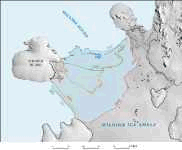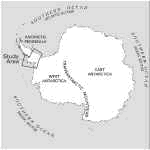This release can be found in the USGS Newsroom at: http://www.usgs.gov/newsroom/article.asp?ID=2409.

News Release | ||||||||
|
Ice Shelves Disappearing on Antarctic Peninsula
Glacier Retreat and Sea Level Rise are Possible Consequences
Ice shelves are retreating in the southern section of the Antarctic Peninsula due to climate change. This could result in glacier retreat and sea-level rise if warming continues, threatening coastal communities and low-lying islands worldwide.
Research by the U.S. Geological Survey is the first to document that every ice front in the southern part of the Antarctic Peninsula has been retreating overall from 1947 to 2009, with the most dramatic changes occurring since 1990. The USGS previously documented that the majority of ice fronts on the entire Peninsula have also retreated during the late 20th century and into the early 21st century.
| Related Podcasts |
 Disappearing
Ice Shelves on Antarctic Peninsula Disappearing
Ice Shelves on Antarctic Peninsula
|
 Download
directly | Details Download
directly | Details
|
The ice shelves are attached to the continent and already floating, holding in place the Antarctic ice sheet that covers about 98 percent of the Antarctic continent. As the ice shelves break off, it is easier for outlet glaciers and ice streams from the ice sheet to flow into the sea. The transition of that ice from land to the ocean is what raises sea level.
“This research is part of a larger ongoing USGS project that is for the first time studying the entire Antarctic coastline in detail, and this is important because the Antarctic ice sheet contains 91 percent of Earth’s glacier ice,” said USGS scientist Jane Ferrigno. “The loss of ice shelves is evidence of the effects of global warming. We need to be alert and continually understand and observe how our climate system is changing.”
The Peninsula is one of Antarctica’s most rapidly changing areas because it is farthest away from the South Pole, and its ice shelf loss may be a forecast of changes in other parts of Antarctica and the world if warming continues.
Retreat along the southern part of the Peninsula is of particular interest because that area has the Peninsula’s coolest temperatures, demonstrating that global warming is affecting the entire length of the Peninsula.
The Antarctic Peninsula’s southern section as described in this study contains five major ice shelves: Wilkins, George VI, Bach, Stange and the southern portion of Larsen Ice Shelf. The ice lost since 1998 from the Wilkins Ice Shelf alone totals more than 4,000 square kilometers, an area larger than the state of Rhode Island.
The USGS is working collaboratively on this project with the British Antarctic Survey, with the assistance of the Scott Polar Research Institute and Germany’s Bundesamt fűr Kartographie und Geodäsie. The research is also part of the USGS Glacier Studies Project, which is monitoring and describing glacier extent and change over the whole planet using satellite imagery.
The report, “Coastal-Change and Glaciological Map of the Palmer Land Area, Antarctica: 1947—2009” and its accompanying map is available online.
The other completed reports in the Coastal Change and Glaciological Maps of Antarctica series can be viewed online.
Photos for this release:
Visit: http://gallery.usgs.gov/tags/NR2010_02_22 for all available photos.


USGS provides science for a changing world. For more information, visit www.usgs.gov.
Subscribe to USGS News Releases via our electronic mailing list or RSS feed.
**** www.usgs.gov ****
Links and contacts within this release are valid at the time of publication.



